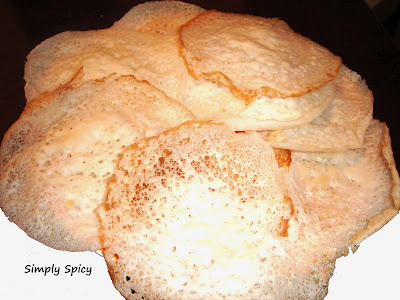 This is a popular breakfast dish in kerala. Made with a batter of rice, coconut and yeast, which is fermented till the batter rises in volume. It's called vellay (white) appam (pancake). In the original traditional recipe, toddy was used to ferment the batter. It's got lacy edges and soft center.It's enjoyed with vegetable stew, Potato Kurma, mutton or chicken stew / Ishtoo, fish mollee or just simple sweetened coconut milk. This can turn out to be quite a heavy breakfast or a brunch.
This is a popular breakfast dish in kerala. Made with a batter of rice, coconut and yeast, which is fermented till the batter rises in volume. It's called vellay (white) appam (pancake). In the original traditional recipe, toddy was used to ferment the batter. It's got lacy edges and soft center.It's enjoyed with vegetable stew, Potato Kurma, mutton or chicken stew / Ishtoo, fish mollee or just simple sweetened coconut milk. This can turn out to be quite a heavy breakfast or a brunch.Ingredients
2 cups - Raw rice or Basmati rice
1 cups - Fresh grated coconut
1/4 cup - Cooked rice
1/2 tsp - Yeast
1 tsp - Sugar
1/4 tsp - Salt
Method
1) Soak raw rice in water for 4 to 5 hours.
2 ) In a grinder, grind soaked raw rice, grated coconut and cooked rice, little at a time to a smooth paste with water. The batter should not be too watery nor too thick.
3 ) Pour the batter into a utensil. Since the batter will ferment and rise in volume, use a big enough utensil.
4 ) In a small bowl, take 1/4 cup lukewarm water. Add sugar, stir and dissolve it. Add yeast to this solution. Let the sugar work it's magic and the yeast will rise. Pour this yeast solution to the batter and stir well.
5 ) Rest the batter in a warm place to ferment and rise in volume. (You can make the batter in the evening and rest it overnight to ferment.) Add salt to the batter and stir.
6 ) Heat a non- stick pan or a vellayappa chatty to make vellayappam.Grease the pan with little oil. Pour one big spoon of batter to the pan, lift the pan from stove and slightly twist around to spread the batter in the pan to make a circular shape. Close with a lid and cook on low heat.
7 ) Take the cooked appam from the pan and serve hot. Use rest of the batter to make more vellayappam's.

Serve with egg masala curry and enjoy your breakfast !
Technorati tags : Indian breakfast, Pancake, fermented food,coconut recipe



















 Steam for 10 minutes. When fully cooked. Take off the steamer and place to cool. Then scoop out the stuffed mussels from the shells.
Steam for 10 minutes. When fully cooked. Take off the steamer and place to cool. Then scoop out the stuffed mussels from the shells.







